|
|
Click on the book title to buy
×× Objects in Mirror May Be Closer Than They Appear ××
| |
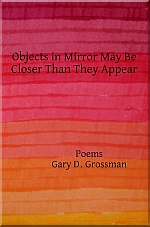 
Objects in Mirror May Be Closer Than They Appear
Objects in Mirror May Be Closer Than They Appear
By Gary D. Grossman
|
|
Poet Gary Grossman has done it again! He’s written another fabulous collection of poems that left me wanting more. “Kale cultivars embrace frost, and their sage-green to rosy bodies makes them as luscious as freshly licked nipples on an arching chest,” the poet proclaims in “Covering the Beds.” Grossman’s unique style and POV are impressive, and make this book a must read.
—Alexis Rhone Fancher, author of Brazen, Triggered, and The Dead Kid Poems
Gary Grossman’s poems combine a scientist’s cool detachment with a poet’s intense yearning to create a voice uniquely his own. He looks back at a traumatic childhood with clarity and compassion, and at the complexities of everyday experience with humor and wisdom. Broadly speaking, the poems focus on the wonder of life and the inevitability of death in the human and the natural worlds. More specifically, they address the poet’s awareness of his own aging and mortality, which is always closer than it appears.
—Eric Nelson
In Objects in Mirror May Be Closer Than They Appear, poet Gary Grossman uses mirror and microscope to observe the closer-than-you-think past. With equal care, he analyses outer layers of pretense, disguise, and skin. Combining the personal and the scientific, he sees beyond the moment. “Even in poetry,” Grossman explains, “genius begins as atoms no one else has cleaved.” Filled with birds, gardening, and mating, Objects in Mirror addresses—in prose poems and free verse—the humorous and the heady. The poet moves easily from decaf espresso, Zoom poetry readings, and old Woody Allen jokes to his mother’s bipolar disorder, bully foster brothers, and a collapsing spinal cord. As Grossman states, “My wife says I’m less bruised than most old apples.” He suggests aging is “a matter of survival,” a claim made with rejoicing and resignation. Yet these poems, both tart and sweet, are ripe and ready for the picking. Enjoy.
—Marjorie Maddox, author of Seeing Things
There is a lot to admire in Gary Grossman's work in general, and in Objects in Mirror May Be Closer Than They Appear in particular. He deals with life and the world with sensitivity and insight. He sees through artifice and lies brilliantly, and he gives us moments of great beauty. But many poets can do this. What distinguishes Grossman's work is that he has the soul of a poet, but the education and training of a scientist. He understands what great nature poets all understand, that the beauty and magic of nature is contained in the science that describes it. He unlocks the magic of nature for us. Through his work, we understand the intricacies of the natural world, but with his poet soul, he shows us the natural world with grace.
—John Brantingham, former Poet Laureate of Sequoia and Kings Canyon National Parks
|
|
|
|
×× Tragedy in the Arugula Aisle ××
| |
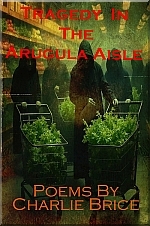 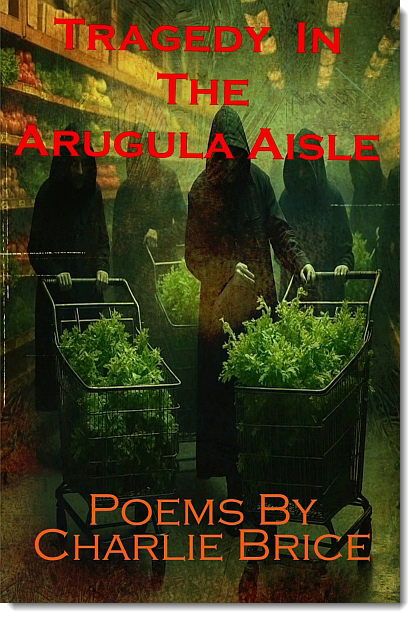
Tragedy in the Arugula Aisle
Tragedy in the Arugula Aisle
By Charles W. Brice
|
|
Charles Brice is a poet of wit and weight, love and defiance. Beneath the jokes and banter is the shadow of family tragedy. His father's alcoholism and his mother's anger wounded him as a child, and humor is a way of lightening the burden of guilt while healing occurs through awareness of the random beauty of the world. In one poem "Love", the poet evokes both the steamy aroma of a street pretzel in New York City in the ’80s as well as a little boy's cleats on a soccer field. Through the power of noticing, Brice finds both his subject and his voice. Kayaking in the far north, he writes Kindness floats in this desolate place of white/and blue ice.
—Michael Simms, author of Strange Meadowlark
With tightrope language, Brice soars across the countries of grief and humor in these poems with compassion and enough wit to bear the darkness of a coming mortality. His narratives weave through the pages of this collection like a wistful dream. At its heart, Brice’s voice teems with life and leaps out at the reader. These poems proffer a voice of wisdom, laughter, sadness, tenderness and ultimately of hope, just as the closing poem, Evening on Karl Johan Street, 1892 proclaims: “We are together,/marching towards bliss/ because we must.” Tragedy in the Arugula Aisle stands as a testament and a lush travelogue of a richly lived life.
—Robert Walicki, author of Black Angels
Here are some reasons I love Tragedy in the Arugula Aisle. First, because it’s called Tragedy in the Arugula Aisle. And because in one poem he says, “There’s nothing like the gush and spurt / of eighth-grade libidinal excretions…” And in another poem he says, “I found a wallet / in a culvert once—no money or credit cards, only a photo / of a woman, a child, and a card from Alcoholics Anonymous” (a tiny poem in itself!). And in another he says, “The fall of life wilts everything. I live now / in a marcescence, waiting for the wind / to unfurl the curl.” I love it because when Brice’s beloved cat, Stinky, dies, a sparrow lands on the windowsill of his study the next day: “She was, / of course, Stinky in her bird disguise, / returned to ensure that I would be okay / in my lonely study without her.” In other words, I don’t know any poet who can shift so quickly from the darkly serious to the wildly comic. Charlie Brice shows me things I didn’t know the English language could do. Which is why I came to poetry in the first place.
—George Bilgere, author of Cheap Motels of My Youth
|
|
|
|
×× William Prichard & Co ××
| |
 
William Prichard & Co
William Prichard & Co US
William Prichard & Co UK
By Diane Simmons
|
|
Biography
Diane Simmons lives in Bath, UK. She has been widely published in magazines such as New Flash Fiction Review, Mslexia, Splonk and FlashBack Fiction and placed in numerous flash fiction and short story writing competitions. She is the author of three published novellas-in-flash: Finding a Way (Ad Hoc Fiction), An Inheritance (V. Press) and A Tricky Dance (Alien Buddha). Both Finding a Way & An Inheritance were shortlisted in the UK Saboteur Awards. She has been a co-director of National Flash Fiction Day (UK) since 2018 and is a former director of Flash Fiction Festivals (UK) and reader for Bath Short Story Award. An editor for FlashFlood, Diane has judged flash fiction contests such as Micro Madness NZ, Flash 500, NFFD Micro Competition and the online Flash Fiction Festival and has co-edited all six Flash Fiction Festival anthologies.
|
|
|
|
×× Shopping for Dad ××
| |
 
Shopping for Dad
Shopping for Dad
By Suzanne Greenberg
|
|
Biography
Suzanne Greenberg’s novel Lesson Plans was a Library Journal Editor's Pick, and her short story collection Speed-Walk and Other Stories won a Drue Heinz Literature Prize. Her short fiction and creative nonfiction have appeared in numerous journals, including Mississippi Review, Santa Monica Review, The Florida Review and the Washington Post Magazine. She’s the coauthor with Michael C. Smith of Everyday Creative Writing: Panning for Gold in the Kitchen Sink and, with Lisa Glatt, of two novels for children, Abigail Iris: The One and Only and Abigail Iris: The Pet Project. She received her BA from Hampshire College and her MFA from the University of Maryland. She teaches creative writing at California State University, Long Beach, where she’s a professor of English.
|
|
|
|
×× Burn it All Down ××
| |
 
Burn it All Down
Burn it All Down US
Burn it All Down UK
By Karen Jones
|
|
Biography
Karen Jones is a flash and short fiction writer from Glasgow, Scotland. Her flashes have been nominated for Best of the Net and The Pushcart Prize, and her story "Small Mercies" is included in Best Small Fictions 2019. She has won first prize in the Cambridge Flash Prize, Flash 500 and Reflex Fiction and second prize in Fractured Lit's Micro Fiction Competition. Her work has been Highly Commended or shortlisted for To Hull and Back, Bath Flash Fiction and Bath Short Story Award and many others. Her novella-in-flash When It's Not Called Making Love is published by Ad Hoc Fiction. She is an editor for National Flash Fiction Day anthology.
|
|
|
|
×× This Is the Ship I Used to Be ××
| |
 
This Is the Ship I Used to Be
This Is the Ship I Used to Be
By Jonathan Humanoid
|
|
Jonathan Humanoid offers readers passage on his journey into building and rebuilding a self and a life to be lived. Framing his search for self through metaphors of ships and storms, wreckage, and ghosts, he pulls us toward an understanding of what it means to craft a sense of belonging amidst impermanence.
In spite of its size, the collection explores the subject of self and progression through varying subject matter—navigation and traveling, graveyards and gardening, hunger and cooking, love and loving—with the
"this poem used to be" poems charting a circuitous path. This is Margaret's answer not from god, but from an Uber Eats driver who got hungry while waiting.
Never didactic, This Is the Ship I Used to Be is all at once a late-night conversation between friends, philosophical discussions of time and meaning, geeky wordplay, lyrical confessions, and a promise of better to come.
—LeAnne Hunt
Jonathan Humanoid's This Is the Ship I Used to Be is a collection filled to the brim with warrior words. The unfinished roads to self-love and reinvention are so beautifully paved in the lines of these powerful poems, edited within an artfully structured narrative arc that takes you on an empowering journey. Humanoid's innovative, accessible poetry will resonate with readers and move them with its courage, humor, heart, and unflinching depth.
—Kevin Ridgeway, author of Invasion of the Shadow People (Luchador Press)
The route to healing can be a path of storms, where doubt of survival rears its head. Jonathan Humanoid takes us on a voyage, inviting readers to witness poetry of grief and growth. This Is the Ship I Used to Be is an honest reflection of a soul as it chooses the path of self-love, exploring what it truly means to be oneself in the face of constant change.
—Ellen Webre, author of A Burning Lake of Paper Suns
Biography
Jonathan Humanoid writes poems and is constantly confused. He would like to believe that the writing poetry thing helps with the being confused, but there's no evidence to support this. He writes in the hopes that others will feel less alone by reading his work as he feels less alone by sharing it.
Jonathan has had poems published in Freeze Ray, Fight Evil With Poetry - Anthology Volume One, and Sh!t Men Say to Me: A Poetry Anthology in Response to Toxic Masculinity. He likes making old-school DIY chapbooks and has released three so far called: I Was Never Going to be Normal, How to Accept That Your Words Are Going to Outlive You, and All the Light in Me. The collection This Is the Ship I Used to Be, which explores his experiences with Borderline Personality Disorder, is his first published full-length poetry.
Jonathan is grateful to have so many people who love him. He is glad to finally be one of those people.
|
|
|
|
×× The Geography of the Heart ××
| |
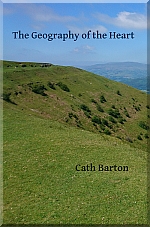 
The Geography of the Heart
The Geography of the Heart US
The Geography of the Heart UK
By Cath Barton
|
|
The Geography of the Heart is an exceptional collection, and Cath Barton uses the novella-in-flash form to do what could not be accomplished so well in any other form, giving us an insider's look at the way the people in a small town in Wales live. This is an intimate book and a beautiful one too. It is one that I have lingered over a few times now because it asks us to spend some long quiet moments with the inhabitants of Abergavenny, and these are people worth spending time with.
—John Brantingham
|
|
|
|
×× Silver Screen Reflections:Writings on Film ××
×× The Fireflies Around Us ××
| |
 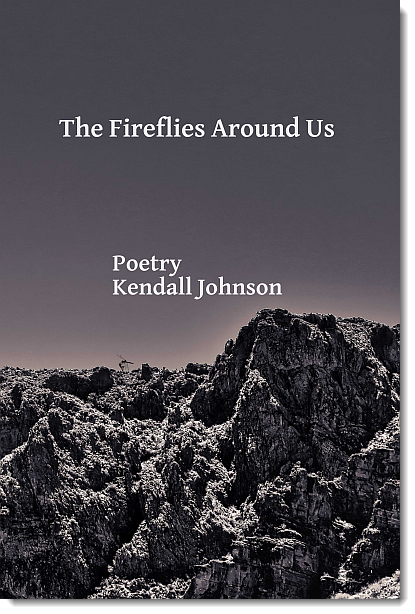
The Fireflies Around Us
The Fireflies Around Us
By Kendall Johnson
|
|
In one of Kendall Johnson's firefly-like haiku that spark in the dark night of the soul brought on by clickbait, disaster porn, doom scrolling news articles a conversation is imagined:
"how did we get here?"
little girl asks her father,
"It's a long story."
It is a profound yet understated, or even unstated comment on the state of the world, state violence, and the degraded states of the nature and human nature in times of regressive politics, rampant consumerism and worldwide pandemic. When the world burns in "a pyromaniacs paroxysm" it can be hard to find the good news that speaks to our kindness, that keeps us human. Fireflies tries to be such book, a tiny light in all that darkness.
—Tony Barnstone, author of The Radiant Tarot
In a vulnerable world and its complex human conditions, Kendall Johnson offers us a view away from hopelessness, not just to feel hopeful, but to consider becoming the hope, the change, the light.
—Jane Edberg, author of the illustrated memoir, The Fine Art of Grieving
These poems acknowledge the seemingly overwhelming challenges humanity faces now but offer hopes as high as mountaintops with stories of triumph over adversity. Kendall Johnson's poems exude heartfelt empathy and a humble, righteous call to see the world with wonder again and to never forget our past resilience as we bravely move forward into the unknown. There are fireflies around us, let the fireflies in this fine and inspiring volume of poetry guide you out of the darkness of our times.
—Kevin Ridgeway, author of Laughing in the Face of Death (Arroyo Seco Press)
|
|
|
|
×× Charcoal and Ink ××
| |
 
Charcoal and Ink
Charcoal and Ink
sketches and poetry
By Ranney Campbell
|
|
Long in gesture, short in phrase, Ranney Campbell's minimalist figure studies and short form poetics are masterfully concise. Both speak volumes. At times suggestive and erotic, often shadowed and always nuanced, they are always worth a double-take. Campbell reminds us that in a world of blatant spectacle, it is the eloquently simple that offers the deepest reward.
—Kendall Johnson Contributing Editor, Journal of Radical Wonder Author, Chaos & Ash, Fireflies Against Darkness
|
|
|
|
×× The Litany of Missing ××
| |
 
The Litany of Missing
The Litany of Missing
By Aruni Wijesinghe
|
|
Aruni Wijesinghe is a project manager, ESL teacher, occasional sous chef and erstwhile belly dance instructor. She holds a BA in English Literature from UCLA, an AA in dance from Cypress College, and a certification in Teaching English to Speakers of Other Languages (TESOL) from UC Irvine.
A Pushcart Prize-nominated poet, her work has been published in journals and anthologies both nationally and internationally. In 2020 she served as guest editor of Redshift 5, an anthology of pandemic-themed poetry (Arroyo Seco Press). In 2021 she co-authored The Undulating Line: Writing Poetry Through Belly Dance (Picture Show Press), a collection of essays, poems and writing prompts that explores the connection between dance and the poetic impulse. Aruni's first solo full-length collection of poetry, 2 Revere Place, was published in May of 2022. (Moon Tide Press).
The Litany of Missing is Aruni's second poetry collection. In it, she explores the themes of love, loss, the non-linear journey of grief, and how what is lost is ultimately found again.
She lives a quiet life in Orange County, California with her husband Jeff and their cats Jack and Josie.
In reading The Litany of Missing, I am reminded of words in Robert Hass's "Meditation at Lagunitas": Longing, we say, because desire is full/ of endless distances. The Litany of Missing is filled with distances: geographic distance, the distance between want and fulfillment, and the ultimate chasm between the living and the dead. Wijesinghe's poem, "November 1st" begins: you arrive/ as a wintering monarch/ the day the veil between worlds/ is thinnest. This collection is a tender meditation on desire and grief.
—Donna Hilbert, author of Threnody, and Gravity: New & Selected Poems
A love story like no other, told in linked prose and verse so hypnotic it shakes us to our collective core. Wijesinghe's journey transports us through the vicissitudes of memory, longing, grief, and poor timing, mining the deepest emotions without a trace of sentimentality. Her searing examination of loss gives readers new perspective on their own blessings, one of which is getting to read the work of this powerful and important voice. "My camino is toward a different compass bearing," she writes. Follow her path.
—Bruce Ferber, author, I Buried Paul
An achingly vulnerable journey into the wilderness of grief and the accompanying despair, rage, and longing. We join Aruni Wijesinghe as she wistfully embraces recollections of her beloved Alex and mourns the dimensions of what could have been. Her captivating depiction of a friendship that traversed years, languages, cultures, and countries will leave an indelible impression on the soul of anyone who has loved and lost. The Litany of Missing courageously honors the pain of loss and embodies the process of starting anew in the face of anguish.
—Veronica Waters, M.S., LMFT
|
|
|
|
×× Moments From My Mother's Life ××
| |
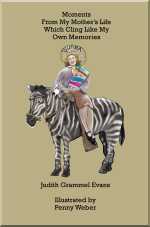 
Moments From My Mother's Life
Moments From My Mother'�s Life
By Judith Grammel Evans
|
|
C. S. Lewis said, "We read to know we are not alone." I think of this while reading Judith Evans's Moments From my Mother's Life Which Cling Like my Own Memories, a novella in verse, combining the lyric intensity of poetry with the forward motion of good story-telling. But, it is more than that. It is also a history of a particular girl growing up in Los Angeles in the first half of the 20th century. We follow Gwen, a smart, artistic, kind-hearted girl, from second grade in 1929 until her marriage in 1942. Our hearts break a bit when she abandons her dreams of a life in art to help her family survive financially during The Great Depression. Here, I think of my own mother who surrendered her dream of writing to the need for steady income in the midst of chaotic family life.
Evans tells Gwen's story with grace, wit, and elegance, in a metrical style that is all her own. When Evans began writing, she wrote both fiction and poetry, but over time developed a form that encapsulates the virtues of both genres, and that is perfect for the stories she has to tell. We are not alone in our dreaming. Sometimes we need to be reminded that dreams might be realized as well as abandoned. Judith Evans did not abandon her dream. You are holding that dream in your hands right now. At age seventy-five, she continues to dream, and to write. I am looking forward to her next book. Dear Reader, I think you will soon be looking forward to that too.
—Donna Hilbert, Gravity: New & Selected Poems
|
|
|
|
×× Rejection Letters ××
| |
 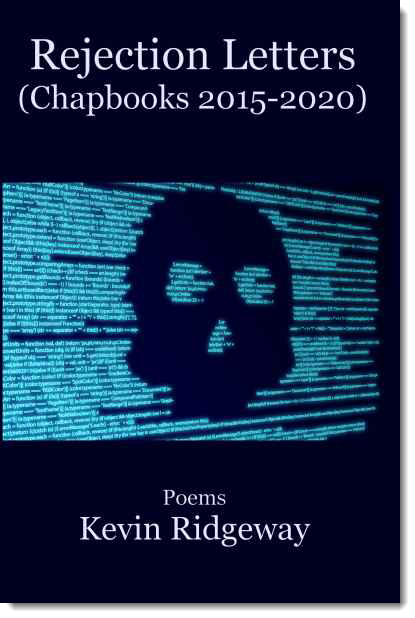
Rejection Letters
Rejection Letters
By Kevin Ridgeway
|
|
Kevin Ridgeway gives us the best of transgressive literature, not gratuity but the brutal negotiation of the emotional corruption of humans, in a way that is far more honest than Bukowski's alpha male posturing. You had better flinch and wince John Wayne because when the whole shithouse comes down, the last men standing will be the poets like Kevin Ridgeway.
—Paul Corman-Roberts
The genius of Kevin Ridgeway is his crystalline honesty and his self-depreciating humor. Each poem places the reader in a raw vignette, a catastrophe or a narrow escape: wind-blown skirts with husbands in pursuit, a sexy-voiced loan collector, a karate kicking man growling on the other side of a fence, a gallery in which he finds his "ill-fitting skin" is "a museum exhibit of its own." Each of these poems creates a passage into his hallways and into his weathered but generous soul; and even though there may be tragedy and smoke in these words, there is also redemption.
—Scott Ferry, author of Skinless in the Cereal Aisle
Kevin Ridgeway may very well be one of the best poets currently kicking. Ridgeway is the definition of the New Modernist Punk Poet, independent to the core and finding beauty in the darkest of alleys and the brightest of landscapes. Walking a path carved not just by Allen Ginsberg and Raymond Carver, but by Gram Parsons and Blaze Foley, Kevin Ridgeway's Rejection Letters are a beautiful glimpse into the soul of the 21st century as it struggles to survive while still deciding what it wants to be.
—Daniel W. Wright, author of Love Letters from the Underground
|
|
|
|
×× More Fireflies ××
| |
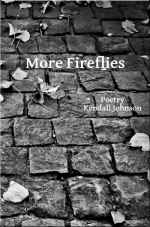 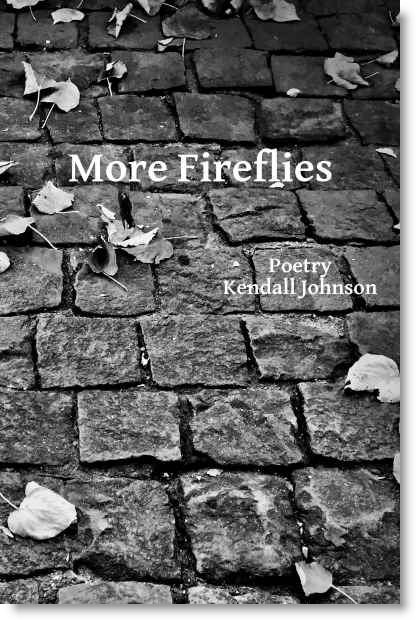
More Fireflies
More Fireflies
By Kendall Johnson
|
|
With this second in the Fireflies series, Kendall Johnson has changed the way I see life and what is possible. There is pain, but there are always fireflies in the darkness. We are not alone, and the light has not yet been extinguished.
—John Brantingham, Inaugural Poet Laureate, Sequoia Kings Canyon National Park
My Mum always told me to make friends with the folks in my lifeboat. I shall always wish Kendall Johnson were among them! With his initial Fireflies Against Darkness, he reminded us in his beautiful, poetic way that hope may not conquer all, but it is the most powerful armor we have against adversity. In this equally affecting sequel, he shows us the power, unwitting—perhaps unwilling—and everyday heroes possess in very small boats with hope at the helm.
—Tracey Meloni, Writer, Nursing Education
Once again, in his second Fireflies book More Fireflies, Kendall Johnson has given us flashes of magic and hope in a bleak and disturbing world—magic and hope that are enduring and soul-deep. Johnson has known darkness of the heart, both in his personal life as a Vietnam veteran and later as a psychologist specializing in the treatment of severe trauma. And he doesn't hesitate to share some of that darkness in this new volume. But, as he did before, he is persistently driven to move us beyond that point where we lose trust in humanity. His "fireflies," small tales and glimpses of individual perseverance, generosity, and strength, are stunning reflections on the power of human goodness and the creative mind. If you are ever close to despair, you will want to hang on to Johnson's More Fireflies like the lifeline it is.
—Kate Flannery, Writer of Ekphrasis for the Sasse Museum of Art, poetry, and memoir
I was so heartened by reading More Fireflies, a continuation of the first collection. We really do need more of these uplifting stories and poem snippets to help counteract the tough news we've been hearing everyday.
—Louella Lester, author of Glass Bricks
What a joy to read More Fireflies, Kendall Johnson's sequel to his remarkable chapbook Fireflies Against Darkness. As someone who savored the first offering, I eagerly read this new volume. I was not disappointed.
—Alexis Rhone Fancher, author of EROTIC: New & Selected, poetry, editor, Cultural Daily
|
|
|
|
×× Fireflies Against Darkness ××
| |
 
Fireflies Against Darkness
Fireflies Against Darkness
By Kendall Johnson
|
|
Kendall Johnson's Fireflies against Darkness is in the end a bright spot in a world that could seem endlessly painful. The author has seen more evil than any one person should have to see from his tour of Vietnam where young men were asked to savage a country and murder strangers, to New York City during the days of 9/11. Between and after that time, he has made a career of confronting evil through his practice as a trauma psychotherapist. What is extraordinary about him is that rather than being dragged down into that evil, he has fought to see the spots of light in an otherwise chaotic universe and to make them his practice. He has maintained his essential self, and this book is a guide for us to do the same.
—John Brantingham, Inaugural Poet Laureate, Sequoia Kings Canyon National Park
In life and in print, Kendall Johnson IS this title and believes in its tiny promises. His words are both heart-breaking and heart-mending—but most of all they encourage hope. No matter how dark the circumstance, man-caused or natural, his beautifully-wrought words are spare beacons, truly Fireflies Against Darkness.
—Tracey Meloni, Writer, Nursing Education
In this collection, Kendall Johnson displays his keen sense of observation in our human condition during our current chaotic times of darkness. Even when writing about how things couldn't possibly seem worse, the power of his words and the beauty of his haiku portray how the actions of others produce fireflies of hope in all of us.
—Annie Bien, Author of Plateau Migrations and Under Shadows of Stars
Kendall Johnson is no stranger to pain and chaos. As a former firefighter, Vietnam veteran, and psychologist specializing in crisis management and the treatment of traumatic stress, he has mastered the art of wrestling with tangled lives. He's perfected that art in this latest volume. He unflinchingly shows us the darkness while at the same time revealing exquisite, small tales of individual perseverance, generosity, and strength. The contrast is stunningly inspiring.
—Kate Flannery, Writer of Ekphrasis for the Sasse Museum of Art, poetry, and memoir
When times are tough, like they have been lately, we sometimes need help to get through. Kendall Johnson gives us that in Fireflies Against Darkness. Short hard news pieces are followed by tiny verses that, like fireflies, light the path connecting us to quietly courageous people who, using art or music or nature, bring us hope. Bring us out of the darkness. I love this book!
—Louella Lester, author of Glass Bricks
This remarkable, highly original chapbook juxtaposes bulletins from the COVID-pandemic, out of control wildfires, natural disasters, mass shootings, and climate change chaos with glimpses of the famous (and not so famous) denizens of the art world and their struggles, including Chuck Close, Georgia and Ida O'Keeffe, and Vincent Van Gogh. I could not stop reading this mesmerizing collection. I didn't want it to end. Kendall Johnson has written something important, holding up a mirror to our tarnished reality.
—Alexis Rhone Fancher, author of EROTIC: New & Selected, poetry, editor, Cultural Daily
|
|
|
|
×× I Know Not What I See ××
| |
 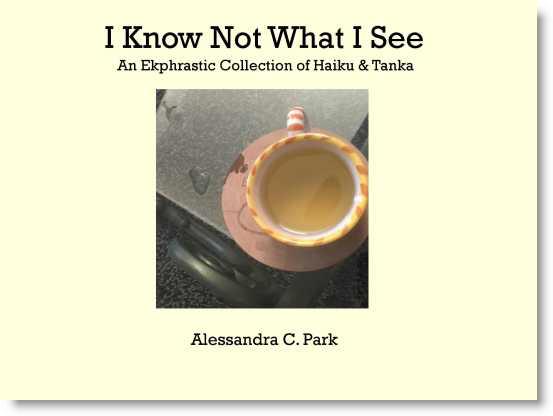
I Know Not What I See
I Know Not What I See
An Ekphrastic Collection of Haiku & Tanka
By Alessandra C. Park
|
|
Alessandra Park draws water from two deep wells: lyricism and meditation. Like the brevity practiced in ancient Japanese forms, these poems ask us to see, and by seeing, understand ourselves as transient and dependent beings. What more could a poet offer than to reveal what is "bright green but only in death"?
—Katie Ford, author of If You Have to Go
Alessandra C. Park is many things, and most of all, she is an original. Each time I read her work, I am struck by its hard truths, wisdom, and exquisite beauty. Now, with this book, her multi-layered lessons can be savored time and again.
—Bonnie Hearn Hill, author of The River Below
I Know Not What I See, is a thought-provoking collection of much more than personal insights as it reflects slices of life in an unveiled delivery of words. Alessandra C. Park has captured random moments in a day, in our environment, and in our own minds. A unique and inspiring collection for most anyone to curl up to!
—Sonia Barrett, author of The Holographic Canvas, Film Producer/Radio Host
In her debut collection, Park pays both attention and homage to the decayed and broken things that go unnoticed and unloved by the world. The detritus she writes about often intersect with nature, proving that "to get away from nature is a fantasy," and that existence is "a song of hope in loss, nature's constancy." At times, musings like these lead Park to discoveries of unexpected beauty; in other moments, she finds questions that may seem too uncomfortable to examine yet speak to the unending ache of being alive. In I Know Not What I See, which joins haiku and tanka with photography, we would do well to follow wherever her eye takes us.
—Lloyd David Aquino, author of Once It's Over
Alessandra C Park's haiku "coexist" captures the spirit of I Know Not What I See: "indoors or outdoors, / to get away from nature / is a fantasy." These haiku and tanka capture those moments between the big moments that constitute what our lives really are. They are snapshots that help us to understand the importance of the moment. Moreover, she immerses us in the natural world, reminding us that there truly is no place that is not a part of nature; it is just our illusions that make us think we are apart from it. Beyond everything else, the photographic journey Park takes us on helps us to see, re-see, and re-understand the world. This is an exceptional collection.
—John Brantingham, Poet Laureate of Sequoia and Kings Canyon National Park
|
|
|
|
×× SurvivalEye ××
| |
 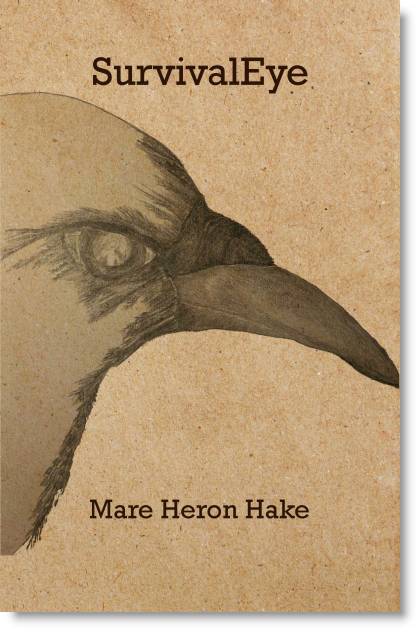
SurvivalEye
SurvivalEye
By Mare Heron Hake
|
|
Mare Heron Hake is a poet, editor, and literary magazine owner of the south Salish Sea region in Washington State. She is also a mother with continuing care-giving responsibilities. Mare didn't get a chance to attend college until she was in her forties. She then followed scholarships to completion of her MFA from the Northwest Institute of LIterary Arts, once located on Whidbey Island, studying with David Wagoner. Because the herons of Whidbey kept her company she now keeps them close to her heart, and her name. As a reader once gladly pointed out, Mare Heron Hake speaks for others and for herself, bearing the name of a mammal, a bird, and a fish.
|
|
|
|
×× Let Us Now Praise Ordinary Things ××
| |
 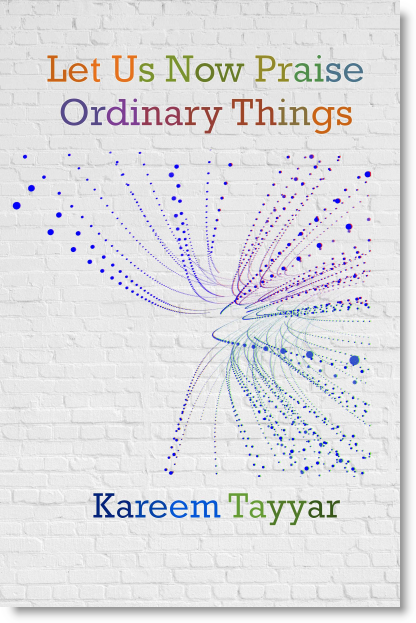
Let Us Now Praise Ordinary Things
Let Us Now Praise Ordinary Things
By Kareem Tayyar
|
|
Nearly everyone I know, when asked what they'll miss when they leave this world, has a list. On mine is Kareem Tayyar's latest collection, Let Us Now Praise Ordinary Things, which is so full of loveliness and hope and beauty it makes me wish the world and everything and everyone in it immortal. This collection — in the spirit of Pablo Neruda, Rumi, and that beloved chronicler of ordinary things, Amy Krause Rosenthal, who left this earth way too soon — celebrates everything from talking to houseplants, to singing in the shower, to late-night drive-throughs and hippies with "hearts as wide as their bell bottom jeans." Open to any work in this wonderful collection and I promise you'll find a golden tether to this life. Especially beautiful are Tayyar's meditations on teaching and students, who, he writes in "On Teaching," are "the ones who soon enough will set about beautifying the world in ways I cannot even begin to imagine." I could not even begin to imagine a collection this full of life and joy. Praise Kareem Tayyar, who gives us his heart and voice at a time when it feels more urgent than ever.
—Lori Jakiela, Author of Belief Is Its Own Kind of Truth, Maybe
|
|
|
|
×× Once It's Over ××
| |
 
Once It's Over
Once It's Over
By Lloyd David Aquino
|
|
In Once It's Over, Lloyd David Aquino captures the always-fleeting—wish and want, starlight and chance—as we witness the tangled trajectories of Adam and Madeline's tumultuous relationship. Their lives cross and miss, and we mine what that missing means. This wonderful debut showcases the ecstasy and ache of intimacy. Aquino measures the sudden fullness of loss, as "Fragility beckons for a mirror image." In these poems, laughter cracks to pieces, and Aquino is prepared, as the most thoughtful poets are, to make certain those pieces do not fall away.
—Michael Torres author of An Incomplete List of Names
|
|
|
|
×× Building Stonehenge ××
| |
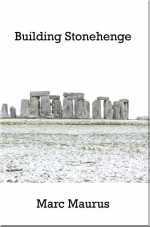 
Building Stonehenge
Building Stonehenge
By Marc Maurus
Foreword by
T. Anders Carson
|
|
Building Stonehenge, by Marc Maurus, is the result of fifteen years of discovery, growth, and wonderful change. Emerging from a self-inflicted Closed Head Injury, he immersed himself in poetry and how-to poetry books, emerging as one of Southeast Michigan's premier poets. At one time, he was the only white member of the Detroit Black Writers Guild, in recognition of his writings from a white perspective against racism. He also co-hosted and co-produced the poetry television show The Poet and The Power with Rod Reinhart. M. L. Liebler is responsible for much encouragement, including booking him into readings at The Scarab Club and The Detroit Opera House. Marc Maurus also hosted his own poetry venue, Poetry in Motion, which ran for several years. The loss of vision in his right eye took that away, but a second opinion assured him he will keep his left, thus this book. Read it, if you dare. And. as he often puts it, aptly dating himself, be there or be square.
|
|
|
|
×× In the Muddle of the Night ××
| |
 
In the Muddle of the Night
In the Muddle of the Night
By Betsy Mars &
Alan Walowitz
|
|
We set out to make a chapbook together because so many of our poems touch on similar themes. Some were written for the same prompts, for the same publications, at the same time. Some were written as a response to each other's poems. For a while, we were exchanging prompts that we both would work on. Since we're both very undisciplined, for otherwise very disciplined—and sometimes driven—sorts of people, that endeavor soon fell apart. At some point, despite any indolence, we decided to put the poems we had written together into a chapbook.
The first section of the books consists of poems that were intentionally written for or in response to the same prompts--for contests, publications, or just as another way for us to communicate with each other. We call this portion, Shared Prompts—Poems by Intention.
The second section has poems in it that we paired because they seemed to have thematic overlap. This part of the book is called Stumbling into Furniture, which is what might happen to anyone in the muddle of the night.
For those readers who don't care how or why these were written, we've provided a thematic "key word or phrase' in the Table of Contents to help you find your way.
Though making this book has been easier to talk about than to do—we both have very busy lives, though you'd never know it from looking at Alan napping most afternoons, or watching the care with which Betsy collects the fur shed by her menagerie from the corners of her home—we've finally managed to put In the Muddle of the Night together. These poems represent Betsy, and Alan, and a long-distance sort of "us." We're proud of this little book.
|
|
|
|
×× Pimp ××
| |
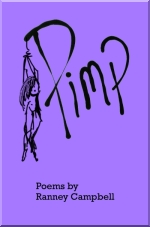 
Pimp
Pimp
By Ranney Campbell
|
|
Nice cars, fists, zippers, and lies. Simultaneously glamorous and crude, at times, Pimp reads like an incantation and these are some of its sacred signs. If you want to understand, you'll be forced to slow down, but before you know it, you'll be pulled along by its frenetic pace — "i made madness i made you mad" — until you've stumbled into a vortex, the eye at the center of which is unmistakably woman.
—Shannon Phillips, author of Bedroom Poems and Body Parts
Ranney Campbell's poems stand out for their brutal authenticity and the risks she takes with them in a playful and dangerous kind of language sharpened with the wit of a postmodern Dorothy Parker. She captures the real areas of life in her poems, which are not for polite society that lies to itself. She is the real deal. Ranney Campbell is courageous in her honesty and has a confident and exciting voice that is wise and visionary. This collection requires several readings and I cannot recommend it enough.
—Kevin Ridgeway, author of Too Young to Know and Fossil of the New Scene
Ranney Campbell's chapbook Pimp broadcasts out of a garage of memory where the Mercedes may or may not be parked near a jacuzzi full of sex workers. But watch out, the poet has pliers and she's pulling out all the electrical wires. Things are about to get intense. A wonderful little book that walks multiple tightropes over desire and violence, the vibrant and the rotting, the beautiful and the stinking, blunt materialism, and the lyricism that hides in the heart of things.
—Stephanie Barbé Hammer,author of How Formal?
Ranney Campbell is from St. Louis, Missouri where she earned BS and MFA degrees from the University of Missouri at St. Louis and lives in Southern California. Her poems have been published or accepted by Misfit Magazine, Shark Reef, Silver Birch Press and The Main Street Rag.
|
|
|
|
×× Fossil of the New Scene ××
| |
 
Fossil of the New Scene
Fossil of the New Scene
By Kevin Ridgeway
|
|
Kevin Ridgeway is a saint—but like any good saint, he is a sinner. His writing dissects the backroads and rooftops of our fallen world with infinite empathy. He regrets it all even as he revels in it.
Junkie Saints. Crushed paintings. Boarding house knife fights. The friend who disappeared into rumors Ridgeway's writing chronicles the aesthetics of forgotten places. He draws beautiful maps of hell so that you can pass through when you find yourself there.
—Scott Noon Creley, author of Digging a Hole to the Moon
I'm certain Kevin Ridgeway's got the stuff: clean straight writing. And he knows what a poem can be made of. That is, if you're looking for something with authenticity. Movement is stumbling through reality, falling on your ass. Often the speaker is just trying to find a way to go on. It's not easy (try it sometime): writing excellent strong poetry about real life and real people. Thank god he hasn't been corrupted. Ridgeway is a STRONG voice. It's rare, especially in American poetry.
—Don Winter, Poet
The semi-annual detox is in full swing, here in the flop house of the deranged and unemployable, ravaged warriors of imaginary wars, a would be pall bearer vagabond, too high on thunder and lightning to know better. drunken suicide pacts made in ant-infested bathtubs, strange rumblings of nonsense manifestos and cigarette smoke permeates the air. Drink cheap malts and pass out in ramen noodle adorned slumber to be woken by the screams of an upstairs knife fight.
—Dave Roskos, editor of Big Hammer & Street Value zines
|
|
|
|
×× Noir Librarian ××
| |
 
Noir Librarian
Noir Librarian
By Marilyn N. Robertson
|
|
Here are deft, appealing poems with a swath of mischief, a dash of humor and ample humanity, perfect for those who still need to be convinced that 1) poetry does not have to be boring; 2) poetry does not have to be incomprehensible; 3)poetry does not have to resemble raw, unskilled spillage of emotions and happenstance. And, further, here are poems for librarians, any librarians, and for those who've ever even met, even seen a librarian. Meet—Noir Librarian.
—Suzanne Lummis author of Open Twenty-Four Hours
Marilyn N. Robertson has a poem in Speechless The Magazine, The Boston Literary Magazine, Chopin with Cherries, A Tribute in Verse, a Poem of the Month for Writers at Work, and a poem in the on-line journal, Capitol and Main. Selected for Poetry in the Windows, a grant project of the Arroyo Arts Collective, she had a poster of her poem up at a business on Figueroa. UCLA Extension featured her in a success-stories series. A poem and accompanying essay appear in the book, Master Class: The Poetry Mystique. Two of her poems appear in Wide Awake, the Poets of Los Angeles.
|
|
|
|
×× Leave With More Than You Came With ××
| |
 
Leave With More Than You Came With
Leave With More Than You Came With
By Christian Lozada &
Steve Hendrix
|
|
Too often, class and poverty are ignored in writing about life in America and specifically in the diaspora that leads people to California. Leave With More Than You Came With is a moving odyssey of mixed-race and multi-ethnic working-class families through other displaced communities. In this collection of fine poems, we travel through the South, Hawai'I, San Francisco and end in San Pedro, "on the hill next to Bukowski." A must-read for anyone who wants to understand the longings of those who come to the Pacific West.
—Naomi Hirahara, Edgar Award-winning author of the Mas Arai mystery series and co-author of Terminal Island: The Lost Communities of Los Angeles Harbor.
Christian Lozada and Steve Hendrix aim to help you leave with more than you came with. Through the process of coming to terms with the years that must be forgotten, these poems offer geographic lessons and explain why we are all immigrants. Circling the South Bay and San Pedro and over the ocean to Maui, Lozada and Hendrix grapple with racism, dementia, and identity in order to transform worry and doubt into a book of beauty.
—Mike Sonksen, author of Letters to My City
|
|
|
|
×× What I Didn't Say ××
| |
 
What I Didn't Say
What I Didn't Say
By James Mauch
|
|
James Mauch's work over a long career has been collected in this brilliant book. Anyone who teaches or who lives the life of the mind will be moved by the kindness at the center of What I Didn't Say. Here, Mauch gives us a view into compassionate intellectualism, a view that smart people can and should use their intelligence to find their way into emotion. It's beautiful and touching. It is the work of a true poet.
—John Brantingham, Poet Laureate of Sequoia and Kings Canyon National Park
Born and raised in Maywood, California, James Mauch earned his BA in English in Mexico City, Mexico and his MA in English at UC Berkeley. He taught English at Foothill College in Los Altos Hills, California for thirty years. During a sabbatical in 1973-1974 James lived in Fayence, France translating modern French poetry into English. Co-translator: Modern Hindi Poetry, 1963 edition. His poems have appeared in Beloit Poetry Journal, Western Humanities Review, Poetry Northwest, The Malahat Review, and others. He resides in Claremont, California.
|
|
|
|
×× Seven Countries ××
| |
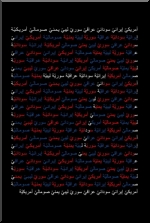 
Seven Countries
Seven Countries
|
|
On January 27, 2017, the 45th President of the United States issued Executive Order 13769. Protests, airport chaos, and legal resistance quickly followed. The order is titled, "Protecting the Nation from Foreign Terrorist Entry into the United States," but is more commonly known as "the Muslim ban." Citizens from the following 7 countries were, in effect, barred from entering the United States: Iran, Iraq, Libya, Somalia, Sudan, Syria, and Yemen.
On February 9, 2017, a temporary restraining order against the ban was upheld by the U.S. Court of Appeals for the Ninth Circuit. On March 29, 2017, the ban's replacement, Executive Order 13780, was halted by an indefinite preliminary injunction. It has been determined that both bans violate the constitution of the United States.
The pages of this anthology contain the voices of Iranian, Iraqi, Libyan, Syrian, and Yemeni, as well as Egyptian and Moroccan, poets.
All the proceeds from this book will go to the American Civil Liberties Union.
|
|
|
|
|
|

